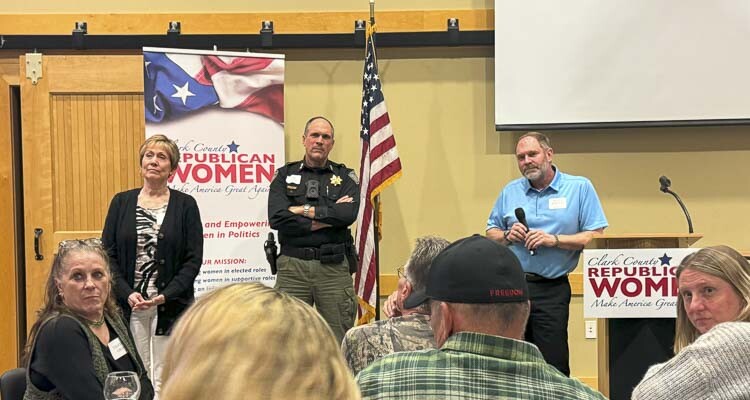
The slogan of the March 21 event was ‘Don’t be scared, be prepared’
Leah Anaya
for Clark County Today
The Clark County Republican Women (CCRW) hosted their bimonthly dinner event meeting Thursday. The theme of the March 21 event was emergency preparedness, with the slogan: “Don’t be scared, be prepared.”
The speakers focused on preparations for families for emergency events, whether those events are naturally occurring or based on civil unrest. CCRW President Liz Cline was adamant to preface the speakers, saying their intent is not to stoke fear into attendees, but rather to ensure that families are ready for any emergency event that may be present as a possibility in Clark County.

The first speaker, Scott Johnson of the Clark Regional Emergency Services Agency (CRESA), focused on the realities of what could occur specifically in the area of Clark County.
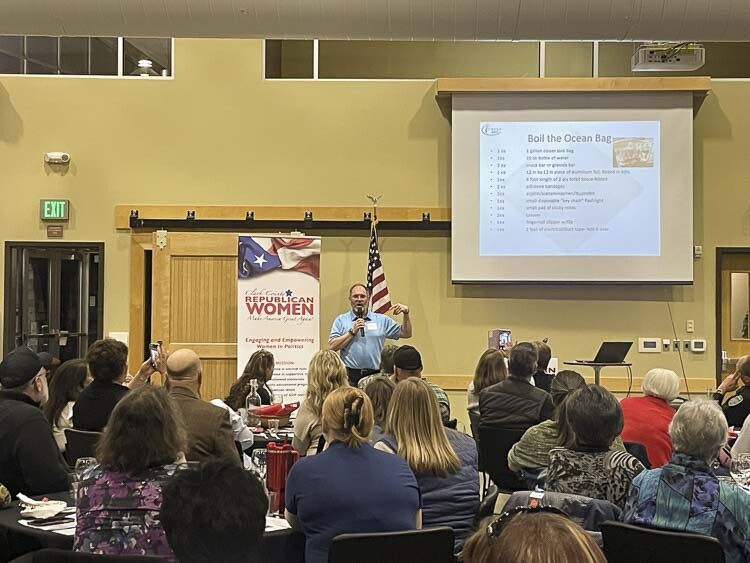
“Let me just tell you right now,” Johnson said. “The possibility of a tsunami in Clark County is zero. They won’t let me put a zero, so on my chart, I rated it as a one. But it’s zero, so we don’t need to prepare for that scenario. We need to focus on what is a possibility here.”
The highest threats (receiving fours on a scale of one to five) were wildfires, extreme heat, and extreme winter (ice). These were followed by an earthquake at three, and twos were floods, a volcano erupting, dam failure, landslide, draught, and tornado.
Johnson pointed out that people deal better with adversity collectively, meaning they can handle things better when residents function as a community and look out for each other. He said it’s important that everyone in one’s household be prepared so that they can also reach out and assist neighbors. Often, neighbors are able to help each other in a mutually advantageous way. Prioritizing during an emergency is important, with the first priority, of course, being life – checking self for wounds, wounds on family members, etc., then incident stabilization and critical asset protection.
“Start small,” Johnson said regarding emergency preparedness, “but start. Do what you can and find a place where you can, and just start.” He discussed the difference between a go-bag and a shelter-in-place kit, with the go-bag needing to be smaller and something you can carry or pull to an emergency meeting location, such as a school, and the shelter-in-place kit being something that can sustain every family member for several days. No matter which you’re working on, Johnson said to make sure it’s things that you and your family will actually use. Don’t stock up on five-gallon water jugs if they’re too heavy for anyone in your house to lift, for example, but rather use smaller, easy to move containers.
“Don’t forget your hot water heaters, too,” Johnson said, adding that they can often hold several days’ worth of water for a family. A family should have one gallon per person per day of potential shortage.
Food is obviously an important ingredient to emergency preparedness, but one thing Johnson mentioned was making sure it’s food one’s family would actually eat. It doesn’t help, he said, to have loads and loads of food that no one will touch. “Stock up on food that will sustain your family, and then in a year, eat it all and replace it with newer food with a later expiration date,” he said. He added that food can also be used as a comfort in emergency situations, so adding things that are either familiar or serve as an extra treat for family members can be helpful. “Don’t forget your pet food!”
Sanitation is important and something some might overlook. Johnson discussed using a separate bucket for each type of body waste, and then digging holes and dumping them once they get filled to a certain point. “Get a pool noodle, cut it in half, and line the bucket with that for comfort,” he added. First aid is obviously important, but Johnson said that buying things that seem helpful but no one in the home knows how to use are not helpful. “Focus on things you actually know how to use,” he said, “and don’t forget about prescriptions.” Specifically, he said to make sure you know how to store prescriptions, especially things like insulin that have to be kept cold. “Yes, cold, but what’s the optimal temperature? How can you work to make sure to keep it as close to that temperature as possible? These are things that are important to know.”
When it comes to lighting, Johnson said to make sure you have a variety. You’ll need candles with a lighting source, and also electric lights. “One of the most important things you can purchase for lighting is a headlamp,” he said. He suggested placing pieces of cardboard in between batteries kept in items like that to prevent corrosion, and keeping extra batteries on hand as well. Keeping trash bags and tarps are helpful in the event of shelter collapsing or no heat- trash bags can be used as sleeping bags too, he said. A family will also need tools on hand, but again, tools they know how to use, and that do not require power or batteries. A hand-powered can opener is essential. Seasonally appropriate clothing should be kept handy, and should be updated often in the case of growing children. This includes shoes.
A communication plan is something that should be considered before an emergency as well. Johnson suggested having a person out of state who can be contacted by family members looking to check in. Local phone lines may be tied up, but it will be easier to contact someone out of state if needed, who can contact others local to the emergency. An AM/FM radio is essential for information, as that will be the most reliable source should the power grid go down thanks to the high resiliency of those towers. A hand-cranked radio should be considered to use as little energy as possible. Communication also includes neighbors, and seeing how you can help each other.
Critical documents should be loaded onto a thumb drive- not just cloud-based. Johnson suggested mailing a thumb drive to a family member out of state too, and making sure to update it. This includes birth certificates, marriage certificates, insurance, property deeds, etc. He mentioned one emergency situation that led to the complete deterioration of documentation for home boundary lines, etc., so having this type of information available could prove extremely useful. “Do you have 30 minutes per month to spend on emergency preparedness?” Johnson asked. “You do, and you should. That’s all it takes. Again- start small!”
Sheriff John Horch was the next speaker. Horch encouraged people to also keep their vehicle gas tanks full as much as possible. “My wife and I always make sure to fill up when we get to about a half a tank, because you just don’t know.” He mentioned the recent La Center fires, where people could not move their vehicles because their gas tanks were on empty. This could be easily avoided in the future, he said, if people were prepared by keeping gas tanks as full as possible.
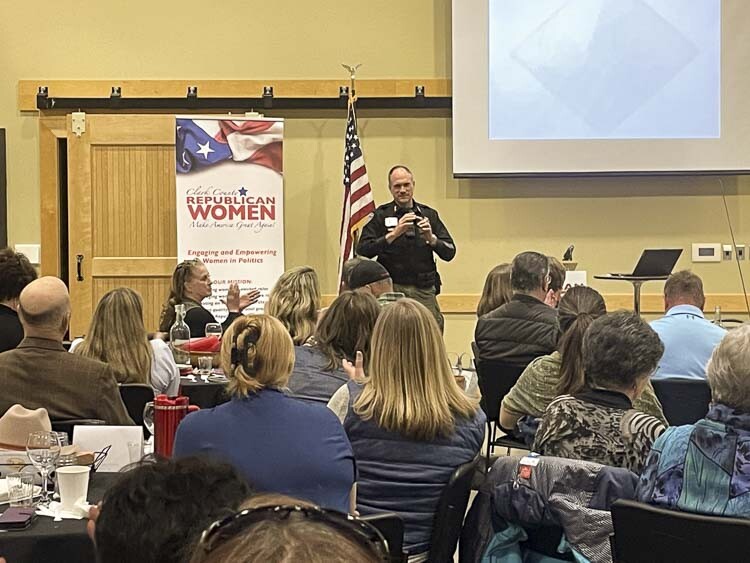
Sheriff Horch touched on other types of emergency and safety preparedness as well. “Ladies, if your husband is in the store grocery shopping and you’re waiting in the car, please get off your phone. Be aware of your surroundings,” he said. This is an easy target for criminals. He also suggested getting some type of working camera in front of homes. “It is extremely helpful for law enforcement when victims or neighbors have a Ring camera, or anything like that. It helps the crimes get solved. The more cameras, the better,” he said.
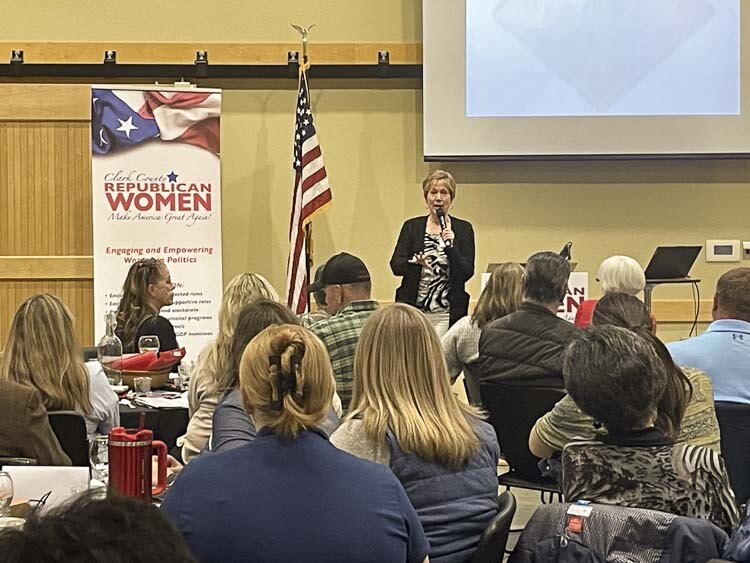
Clark County Republican Party State Committeewoman Anne O’Neill was the final speaker of the night. She pointed out the many vendors present during the event, such as ThriveLife foods, Reeves Precision Matters self-protection, and SafeFire indoor shooting range. She spoke on the usefulness of canning in keeping healthy foods around in case of emergency, and echoed Johnson in that foods the family likes should be stored. She said to keep “fun foods” around as well to help with comfort or treats during potentially hard times. “Keep fun activities around as well – games, new puzzles that can be a treat, cards, things to keep you occupied and having as much fun as possible.”
“Do you have a weapon in your home?” O’Neill asked. “If the answer is yes, you better make sure you know how to use it! And the rest of the people in your home. “Start small, but start! That’s the important part,” she said.
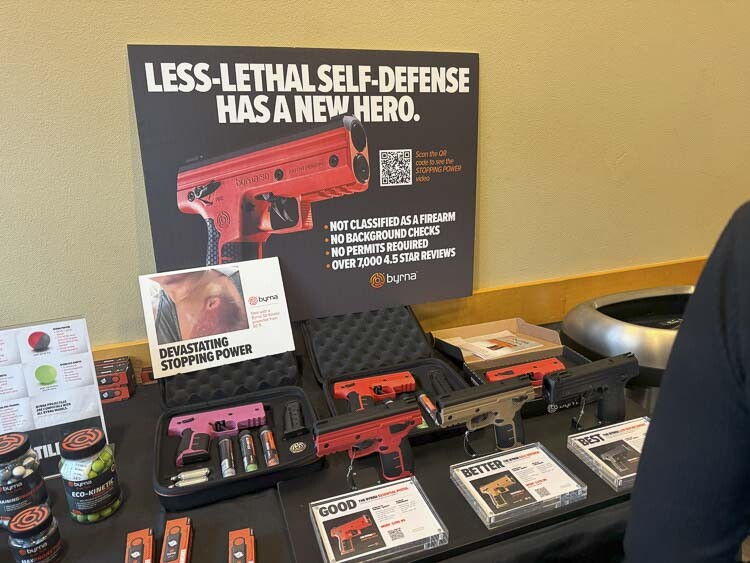
CCRW passed out multiple pamphlets meant to assist with emergency preparedness. Some resources listed were from YouTube and included Homesteading Family, Suttons Daze Pantry Preparedness, That 1870’s Homestead, and Wicked Prepared. The organization also suggested visiting the following websites: Washington State Prepare in a Year Guide and Emergency Essentials. Local businesses helpful to emergency preparedness are Bob’s Sporting Goods and Portland Home Storage Center.
Also read:
- With gratitude and love — Honoring all the mothers in our communityClark County Today shares a heartfelt message honoring moms across the region on Mother’s Day.
- Leslie Lewallen officially files for re-election to Camas City CouncilLeslie Lewallen launches her re-election campaign for Camas City Council, highlighting key accomplishments and a continued focus on community priorities.
- Letter: ‘Something is wrong when our vote means nothing’Bob Zak challenges the political handling of the I-5 Bridge project and urges voters to demand accountability.
- Letter: ‘This is a time for bold leadership, clear advocacy, and strong representation’Justin Forsman of Vancouver announces his candidacy for mayor and outlines a bold new platform focused on rights, infrastructure, and local governance.
- Opinion: Schools notifying parents about the kinds of care kids can decide on their own didn’t make itElizabeth New criticizes the removal of Amendment 1164 from current legislation, arguing it leaves parents uninformed about health care services accessed by their children through schools.
- Ridgefield School District invites community to help shape new Strategic PlanRidgefield School District is hosting three public sessions to gather community input for its new Strategic Plan.
- Julianne Lawrence is first paid director of Two Rivers Heritage MuseumJulianne Lawrence has been appointed the first paid director of the Two Rivers Heritage Museum following a strategic effort by the Camas-Washougal Historical Society.











